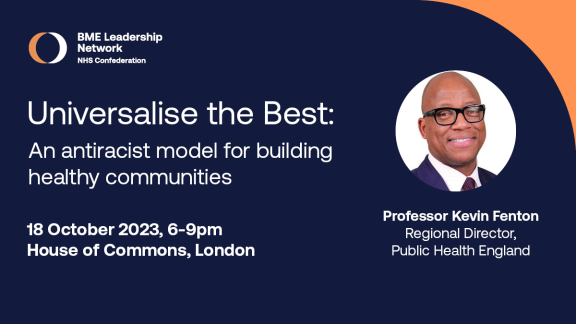"Black History Month is a celebration of the contribution of the African diaspora to this country. This year’s theme of ‘Saluting our sisters’ is particularly applicable to the health service which has benefitted from the contribution of black women since its inception. Our sisters are the backbone of the NHS."
What do we mean by the best?
‘The best’ is a just equal equitable health service, working effectively in in partnership with communities. We must recognise the importance of providing great access and experiences and equal outcomes for all and acknowledge the excellent work going on around the country to create more equitable care.
The key challenge for the NHS in tackling inequality, is how we move from the pockets of excellence that we know exist to socialising best practice and universalising the best.
The difficult truth is that post-Covid inequalities are widening, not improving. These inequalities are many and while this lecture focuses on racial inequality, we do not tackle racial inequality at the expense of other types; intersectionality remains key, and in particular, we must be aware of the critical intersection of race and socioeconomic class.
What we learned from Covid
“Of all the forms of inequality, injustice in health is the most shocking and the most inhuman….” Dr Martin Luther King Jr.
The stats were stark pre-pandemic. Maternal mortality, heart disease and certain cancers were all higher among certain groups. Covid-19 showed how inequalities manifest in real time and the devastating impact on the most vulnerable communities.
Covid was no leveller. What it did was find long-standing inequalities and exposed them.
While we had the stats, colour and context was needed to illuminate the epidemiological evidence; community engagement paints the human pictures of peoples’ experiences. The lack of representation and engagement from certain communities left vital gaps in government communications during the acute phase of the pandemic, the consequences of which resulted in significant mid-course correction for pandemic response.
What we saw during the initial acute phase of the pandemic was substantially higher death rates for black and Asian communities. We also saw reduced rates of testing within these communities as a result of the stigma associated with having Covid, and a positive test meaning individuals having to engage with health service that they didn’t trust, as well as not being able to work, which would of course have consequences.
The vaccine programme: what worked
The progression of this was vaccine hesitancy once the jab became available. The consequences of exclusion came home to roost and we saw how the NHS had lost its legitimacy in certain communities.
What worked was the power of data; targeting interventions and evaluating their efficacy and engaging with communities instead of expecting them to come to the NHS.
Applying these lessons
These lessons can be applied now – we don’t need to wait for the results of the Covid enquiry to change things.
Without successful outreach and community partnerships the vaccine programme wouldn’t have been possible. The learning here is that investment in the community itself is as important as investing the health and care system to ensuring resilience in communities.
Racism is a system of structuring opportunity based on the concept of race. Racism saps the strength from the whole of society through the waste of human resources. We are all worse off because of structural discrimination. We’ve seen the impact of people being disengaged from healthcare services - seeking care at a later stage increases pressure on the service and reduces capacity for all.
What we know about inequality within services
-
Racism creates bias in clinical decision-making and poor experiences and outcomes due to the lack of cultural competence, the need to challenge this is why equality, diversity and inclusion is so important.
-
Disparities of experience in workforce impact productivity and engagement.
-
Lack of diversity in clinical trials leads to lack of trust in the results; innovation is not possible without that trust.
-
Treating racialised patients often means operating at the intersection of race and poverty. There is no competition. These factors interact and have huge impact.
London: a case study
How was all this knowledge operationalised in London? A city of contradictions and disparity where we often record significant variations in life and healthy life expectancy in richest part of country:
-
Leadership and governance for health inequalities at the highest levels.
-
Commitment to integrate anti-racism as key pillar in health inequalities work.
-
Working with partners – on increasing housing standards and providing a living wage.
-
Promoting healthy lifestyles.
London regional anti-racism framework - five key pillars
- Asking leaders to commit publicly.
-
Workforce diversity and inclusivity.
-
Health equity programmes.
-
Organisations using their power as anchor institutions.
-
Strengthening work with communities.
Read Professor Fenton's report produced for the Office for Health Improvement and Disparities Mind the gap: working together to reduce health inequalities.






